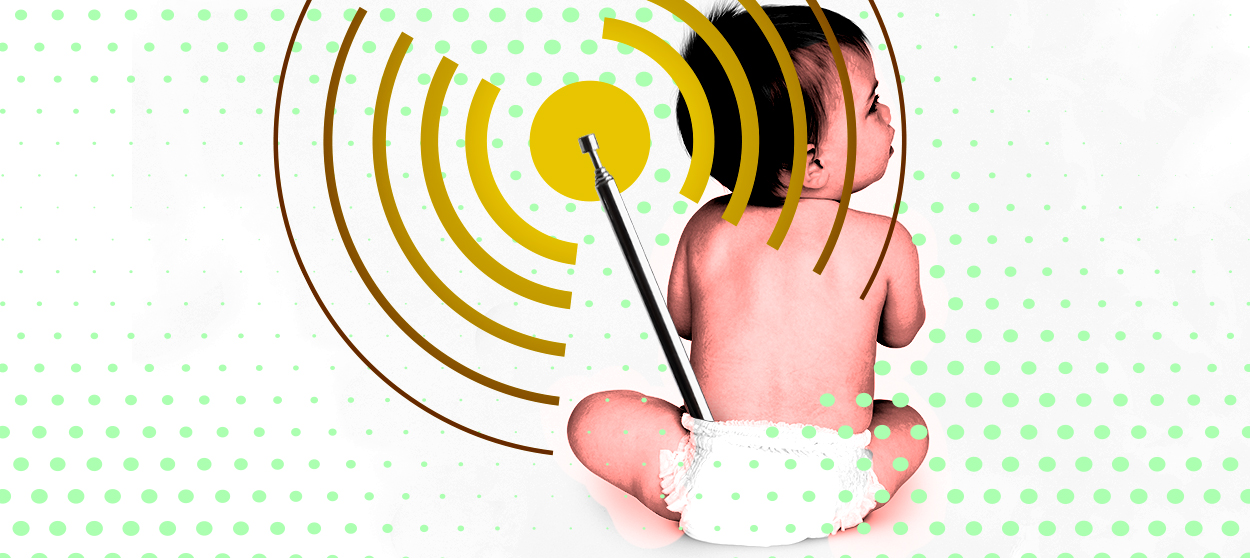Parents, your nose is the original smart diaper. Use it.
The humble schnoz may not come with an app, but your olfactory system is smarter than a sensor from Big Diaper


A free daily email with the biggest news stories of the day – and the best features from TheWeek.com
You are now subscribed
Your newsletter sign-up was successful
Diaper manufacturers are worried. American millennials aren't reproducing nearly as early or abundantly as their parents did, so the birth rate in the U.S. is falling. As are diaper sales. Cashing in on small humans' incontinence is harder than it's ever been.
To counter the effect of reproductive dwindling, diaper industry leaders have turned to price inflation, layoffs, and outright gimmickry. Pampers bumped the cost of their signature diaper by 4 percent last year, while Huggies' parent company Kimberly-Clark axed 13 percent of its workforce in January 2018. "You can't encourage moms to use more diapers in a developed market where the babies aren't being born in those markets," Kimberly-Clark CEO Thomas Falk told investors.
Now, both companies are attempting to get parents to spend more money on this staple baby product by tweaking it into something overly complicated and, frankly, really weird: the smart diaper.
The Week
Escape your echo chamber. Get the facts behind the news, plus analysis from multiple perspectives.

Sign up for The Week's Free Newsletters
From our morning news briefing to a weekly Good News Newsletter, get the best of The Week delivered directly to your inbox.
From our morning news briefing to a weekly Good News Newsletter, get the best of The Week delivered directly to your inbox.
Recently, Pampers introduced its line, Lumi, which will launch in the fall, while Huggies, in partnership with South Korean tech company Monit, unveiled its own smart diaper system, Monit x Huggies, in Korea last October. The company plans to bring it to America soon. As Vox explains, these companies are part of a "sprawling diaper-tech war." Even Google parent Alphabet is getting in on the action.
So how does a smart diaper work? From what I can fathom, it's not so much the diapers that are smart but the add-ons that come with them: little sensors that sit on the front on the diaper and monitor the environment inside, then send information to an app on your phone.
I can understand how such a thing might appeal to soon-to-be parents intent on doing everything perfectly for their newborn. When you're waiting anxiously for your new spawn to appear, you don't necessarily know that there are several tells that will alert you to the fact that your child is pooping or peeing. But within days of their birth, you'll have figured out your own kid's cues — from facial expressions and writhing to noticeable temperature changes in the bottom region and good old-fashioned crying. Some diaper brands already have a handy blue line that tells you when they're wet.
Failing all this, you have a nose. The humble schnoz may not come with an app, but our olfactory system is smarter than any clunky, overpriced pee sensor Big Diaper might want you to slip into your baby's pants. Using nostril-to-bum to determine whether something on the yellow-green-brown spectrum lurks in a baby's diaper is almost always a solid bet.
A free daily email with the biggest news stories of the day – and the best features from TheWeek.com
If all these app-and-sensor-free excretion detection techniques fail and you end up leaving your baby to sit in its own mess for a while, it's really not a big deal. There's actually no law that says you need to put on a clean diaper the second an infant lets rip and, arguably, it's smarter to wait a while after the initial tremor as they may not be done.
At best, a pee and poop app might save you from dealing with the occasional fecal tsunami blow out. But that little notification ping, if it goes off at night, could also deprive you of sleep you desperately need. Shockingly, babies' bladders and bowels don't shut off in the wee hours, but unless your kid complains, you definitely don't need to wake yourself and your child up to deal with it.
Also, do we really need another reason to look at our phones when we should be looking at our kids?
If you're anything like most Americans adults, you already spend way too much time using screens — and if you have children, it's probably affecting them. My 3-year-old son regularly asks me to put down my phone when he wants a hug. A baby, on the other hand, can't tell you how dumb and weird it is that you need to look at your phone to determine whether they need a fresh diaper.
In an age where we routinely use technology as a sub for common sense, trusting your judgment when it comes to making decisions about tiny, vulnerable life forms is something that many moms and dads understandably find difficult. Smart diapers will certainly milk this insecurity. I suspect the only real outcome from the introduction smart diapers will be to make already insecure new moms and dads more anxious and less confident of their basic parenting instincts.
